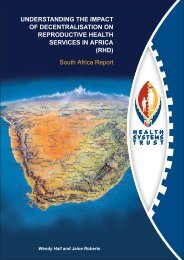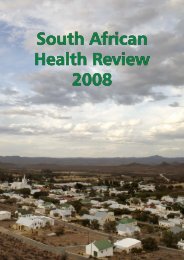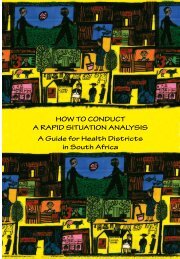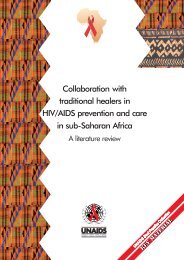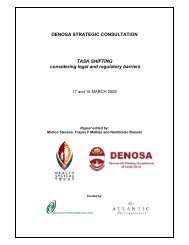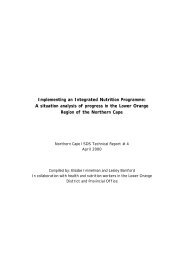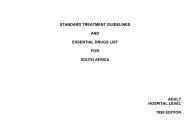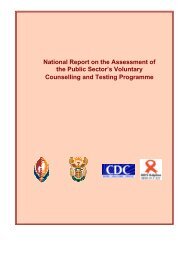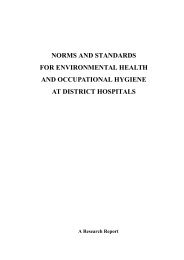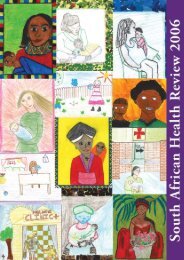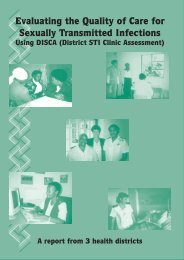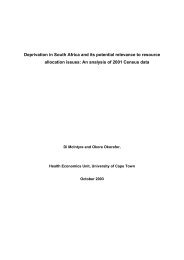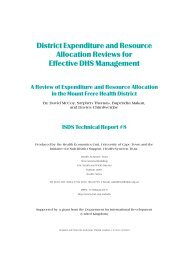SAHR 2007 - Health Systems Trust
SAHR 2007 - Health Systems Trust
SAHR 2007 - Health Systems Trust
You also want an ePaper? Increase the reach of your titles
YUMPU automatically turns print PDFs into web optimized ePapers that Google loves.
From a benefit design perspective this was particularly problematic<br />
in new generation options where diagnosis and<br />
medical management benefits were largely self-funded. The<br />
structure of the CDL encourages a shift in scheme benefit<br />
design towards a disease-based structure as opposed to a<br />
treatment-based structure i.e. a specified benefit for asthma<br />
as opposed to separate benefits for diagnosis, medicine<br />
and consultations.<br />
From a managed care perspective, the primary focus<br />
prior to implementation of CDL was on pharmacy benefit<br />
management as opposed to disease management. The Old<br />
Mutual 2005 <strong>Health</strong>care Survey noted that by 2003 pharmacy<br />
benefit management programmes were widespread<br />
and had become a standard managed care service thatall<br />
schemes would be expected to use. 15 By contrast only 59%<br />
of the respondents to the survey had disease management<br />
programmes (DMPs) in place in 2003. In light of the introduction<br />
of the CDLs, a subsequent increase in the roll-out<br />
of DMPs are likely, particularly in the fields of HIV and AIDS<br />
and diabetes management. Access to benefits is in some<br />
instances conditional on registration or participation in a<br />
DMP. In certain instances, participation in a DMP may enable<br />
a member to have access to enhanced benefits.<br />
Scheme knowledge of their disease profile has been<br />
enhanced considerably due to the introduction of the CDL,<br />
the requirement to submit the data during the shadow<br />
period for REF and the implementation of compulsory ICD-10<br />
coding for providers. The lack of ICD-10 coding prior to this<br />
hampered the ability to perform disease-based analyses.<br />
Moving to strategic purchasing of health<br />
care<br />
Medical schemes tend to be passive purchasers of health<br />
care with many administrators doing little other than verifying<br />
the fee-for-service accounts sent in by providers and verifying<br />
the eligibility of members. Few schemes have become<br />
strategic purchasers of health care on behalf of their<br />
members. Strategic purchasing requires a continuous search<br />
for the best ways to maximise health system performance<br />
by deciding which interventions should be purchased, how,<br />
and from whom. This implies a concentration on network<br />
formation, contracting with selected providers and risksharing<br />
between schemes and contracted providers. It also<br />
<br />
ICD-10 diagnosis coding standard is owned and maintained by the<br />
World <strong>Health</strong> Organization, and is a standard diagnostic classification<br />
system used internationally. This system of alphanumeric disease classification<br />
is the ‘coding standard of choice’ in South Africa in both the<br />
private and public sectors.<br />
requires more attention to quality measurement to ensure<br />
that members receive clinically appropriate care.<br />
Theoretically, consolidation improves purchasing power<br />
but this is not happening because the basis for competition<br />
between schemes has largely been on risk profile<br />
and not on cost-effective delivery of health care. There is<br />
evidence that the largest players are beginning to prepare<br />
for the changed environment that REF will create by actively<br />
attempting to build and contract with networks. The Discovery<br />
Group reported in February <strong>2007</strong> that they need to transform<br />
their value proposition from “being just a funder in the<br />
health care system towards … creating structures that ensure<br />
members get access to a health care system of exceptional<br />
quality, ease of use and one that costs less”. 41 The formation<br />
of the Discovery GP Network was seen as a key element<br />
of this strategy. Although the intention has been to work<br />
constructively with health care providers, there have been<br />
some bruising public battles with specialists. 42 Discovery,<br />
despite acting as administrator for over 2 million of the 7<br />
million lives in the market, has found it difficult to contract<br />
with providers. Other schemes will be keenly watching the<br />
progress of Discovery <strong>Health</strong> Medical Scheme and GEMS as<br />
they transform to being strategic purchasers.<br />
The Medical Schemes Act of 1998 allows schemes to own<br />
clinics and hospitals and to choose to deliver health care<br />
directly. Very few schemes have made use of this legislated<br />
opportunity and the few examples are concentrated in the<br />
mining industry or remote locations.<br />
Constraints on the efficient delivery of<br />
health care<br />
It has long been recognised that the fee-for-service system is<br />
at the root of the problems of cost escalation and supplierinduced<br />
demand in medical schemes. 43 The CMS acknowledges<br />
that the historical system of tariff setting was deeply<br />
flawed in a number of respects. 44 While some progress<br />
was made in 2005 towards understanding practice and<br />
input costs for certain disciplines, the NHRPL process has<br />
to be geared to getting a usable reference price list to<br />
medical schemes in time for pricing contributions each year.<br />
The handover of the NHRPL function from the CMS to the<br />
DoH during 2006 delayed work on the schedule for <strong>2007</strong><br />
resulting in considerable frustration amongst both schemes<br />
and providers. There is a substantial backlog of work on the<br />
NHRPL to bring prices to justifiable levels before any of the<br />
possibilities of altering the tariff to cover encounters rather<br />
than services can be explored.<br />
66



